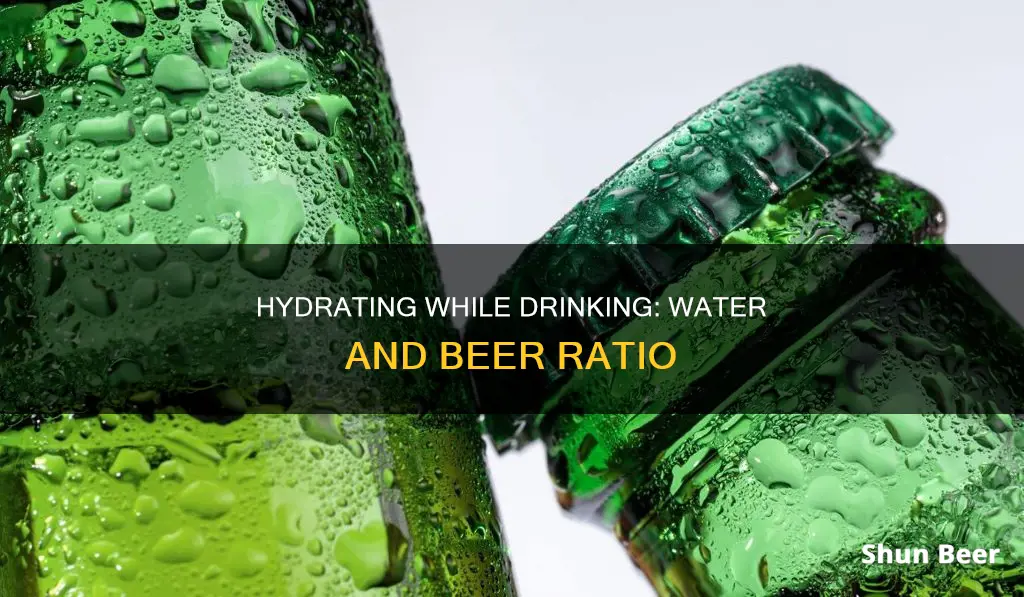
Beer is about 90% water, and it takes a lot of water to produce even small quantities of beer. According to some estimates, it takes between 19.8 gallons and 37.5 gallons of water to make a pint of beer. While drinking beer can contribute to hydration, it also has diuretic effects due to the alcohol content. To offset the dehydrating effects of alcohol, it is recommended to drink water along with alcoholic beverages. However, there is no one-size-fits-all rule, as the amount of water needed to stay hydrated depends on various factors such as body weight, the number of drinks consumed, personal tolerance, and other individual characteristics.
What You'll Learn

Beer is 90-97% water
Beer is mostly water, with water content ranging from 90% to 97%. This means that for every pint of beer, there is somewhere between 0.90 and 0.97 pints of water. This is important to know, especially when considering the dehydrating effects of alcohol.
While beer is mostly water, it is not a substitute for drinking water, and it is important to stay hydrated when drinking alcohol. The diuretic effects of alcohol are a function of your Blood Alcohol Content (BAC), not the Alcohol by Volume (ABV) of the drink. This means that the dehydrating effects of alcohol depend on how concentrated it is in your bloodstream.
The mechanism by which alcohol dehydrates you involves decreasing the sensitivity of the kidney's collecting ducts to Anti-Diuretic Hormone (ADH). This hormone is responsible for increasing the number of channels in the collecting ducts (called aquaporins) that reabsorb water from the urine as it passes out of the nephron (the functional subunit of the kidney) and into the collecting system. By decreasing the number of aquaporins, the urine becomes more dilute and water is lost from the body.
While drinking water while consuming alcohol will not have a lasting effect on hydration while there is still alcohol in the bloodstream, it is still a good idea to try to remain hydrated. A rule of thumb is to drink four times as much water as alcohol to remain hydrated. However, this may vary depending on a person's physiology, body weight, the number of drinks consumed, and other factors.
Celiac Disease and Beer: What's Safe to Drink?
You may want to see also

Water is important for health
Water is essential for health and well-being, and staying hydrated has several benefits for the body. Firstly, water makes up about two-thirds of our body weight, and it plays a crucial role in transporting nutrients and waste products within our bodies. It also helps regulate our body temperature, acts as a natural lubricant and shock absorber for our joints, and is involved in most of the chemical reactions that occur inside us.
Drinking enough water is necessary to maintain proper hydration and avoid dehydration, which can have several negative impacts on our health. Dehydration can cause symptoms such as fatigue, dark yellow urine, dry skin and mouth, dizziness, and reduced cognitive function. In severe cases, it can even lead to fatal consequences. Therefore, it is important to listen to our body's signals and drink water when we feel thirsty.
While the "8x8 rule" recommends consuming eight 8-ounce glasses of water per day, recent research suggests that this may be more than our bodies actually need. Instead, it is recommended to personalize water intake based on factors such as temperature, activity level, age, body size, gender, and level of physical activity. For example, individuals in hot and humid environments, at high altitudes, or those who are athletes, pregnant, or breastfeeding, typically require a higher water intake.
In addition to plain water, other beverages such as tea, coffee, and some alcoholic drinks can also contribute to hydration. However, it is important to note that alcohol has diuretic effects, which can lead to dehydration. Therefore, it is generally recommended to drink water alongside alcoholic beverages to maintain proper hydration.
In conclusion, water is crucial for maintaining health and ensuring the proper functioning of our bodies. By understanding our individual needs and staying mindful of our water intake, we can help keep our bodies hydrated and enjoy the numerous benefits that proper hydration provides.
Peyton Manning's Beer Habits: A Curious Conundrum
You may want to see also

Alcohol is dehydrating
The amount of water you need to drink to offset the dehydrating effects of alcohol depends on a variety of factors, including your blood alcohol content (BAC), body weight, the number of drinks consumed, how full your stomach is, your personal tolerance to diuretic effects, age, and other factors. A general rule of thumb is that you need to drink four times as much water as alcohol to stay hydrated. However, this rule does not take into account all the factors that affect dehydration and is therefore inconsistent and inaccurate.
It's important to listen to your body and drink water when you're thirsty. Feeling thirsty is your body's way of alerting you to dehydration. While it's generally recommended that adults drink about two litres of water per day, the amount of water you need depends on your individual needs, including your temperature and activity level. Those who live in hot and humid environments, at high altitudes, or who are athletes, pregnant, or breastfeeding, may need to drink more water than others.
In addition to causing dehydration, drinking too much alcohol can also lead to other health issues. Alcohol can interfere with the body's absorption of nutrients, affect your mood and energy levels, and contribute to weight gain if consumed in excess. It's important to drink in moderation and to make sure you're staying properly hydrated when consuming alcohol.
Drinking Beer in Public: Alameda's Rules and Regulations
You may want to see also

Water is needed to produce beer
Water is an essential ingredient in beer, making up about 90% to 97% of its content. It is the largest single component in finished beer, and as such, it takes a significant amount of water to produce even small quantities of beer. The water used in brewing comes from two primary sources: surface water and groundwater. Surface water, sourced from lakes, rivers, and streams, tends to be low in dissolved minerals but higher in organic matter, requiring filtration and disinfection. On the other hand, groundwater, obtained from underground aquifers, generally contains higher levels of dissolved minerals but lower organic matter.
The quality and characteristics of the water play a crucial role in the beer-making process. Water ions are vital in the mashing process, where the composition of the water influences the efficiency and flavour of the extracted wort. Additionally, water impacts the perceived bitterness and hop utilisation of the finished beer. The water-to-grain ratio in the mashing process is critical, as it determines the extraction efficiency of the sugars, proteins, and nutrients from the grain.
The first step in brewing beer is malting, where barley is soaked in water to initiate germination. This process activates enzymes within the barley, converting its starch into sugars. The amount of water used during malting depends on the malting process and the type of barley being malted.
Overall, it takes between 4 and 6 litres of water to produce 1 litre of beer. This includes water used for mashing, sparging liquors, and high-gravity brewing, as well as process water for cleaning, sanitising, pasteurisation, and refrigeration. The large amount of water required to produce beer underscores the importance of sustainable water practices in the brewing industry.
Drinking Beer and Losing Belly Fat: Is It Possible?
You may want to see also

Water consumption varies by person
Firstly, it's important to understand that our bodies are equipped with natural mechanisms to regulate hydration. Feeling thirsty is a sign that your body needs more fluids, and drinking water or other hydrating liquids can help alleviate this sensation. This natural thirst mechanism is a reliable indicator of your body's fluid needs, and by listening to it, you can maintain adequate hydration without having to follow strict rules or guidelines.
However, it's worth noting that certain factors can influence how much water a person should drink. For example, individuals who live in hot and humid climates or at high altitudes may require more water to stay hydrated due to increased fluid loss through sweating. Similarly, athletes and individuals who engage in physical activities or strenuous work may need to increase their water intake to compensate for fluid loss through perspiration.
Additionally, life stages and biological differences play a role in water consumption. Pregnant and breastfeeding women, for instance, are advised to increase their water intake to support the additional fluid demands of pregnancy and lactation. As we age, our natural thirst mechanism becomes less sensitive, making older adults more prone to dehydration, and thus, they may need to be more mindful of their water intake.
Other factors that can impact water consumption include body size, gender, diet, and overall health. People with larger body sizes or higher muscle mass may require more water, and men generally need slightly more water than women due to differences in body composition and metabolic rates. Diet also plays a role, as the amount of water needed can vary depending on the types of food and beverages consumed. For example, eating water-rich foods like fruits and vegetables can contribute to overall hydration levels, reducing the need for excessive water intake.
While these factors provide a general guideline, it's important to remember that each person's hydration needs are unique. Individual variations, such as personal tolerance to diuretic effects, kidney function, and overall health, can further influence how much water a person should drink. Therefore, it's advisable to pay attention to your body's signals and adjust your water intake accordingly, rather than adhering rigidly to a predetermined amount.
Kicking the Beer Habit: Strategies for Cutting Down
You may want to see also
Frequently asked questions
Beer is made up of about 90% water, so there are 0.90 to 0.97 pints of water in a pint of beer.
There is no simple answer to this, as it depends on various factors such as body weight, tolerance, age, and more. A general rule of thumb is that you need to drink four times as much water as alcohol to stay hydrated.
The amount of water a person needs to drink per day varies depending on their age, body size, gender, environment, and level of physical activity. While the "8x8 rule" recommends drinking eight 8-ounce glasses of water per day, recent research suggests that drinking between 1.5 and 1.8 liters of water per day is sufficient for most people.
According to one source, it takes 168 liters of water to produce a pint of beer. However, another source estimates that it takes between 19.8 and 37.5 gallons of water to make a pint of beer.







